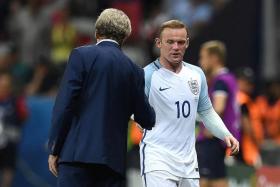Low-key coaches clash for big prize
Deschamps and Santos avoid media hoopla to build finalists in tough times
REPORTING FROM PARIS
FINAL
PORTUGAL v FRANCE
(Tomorrow, 2.50am, Singtel TV Ch 142 & StarHub TV Ch 220 - Eleven EURO)
As players, Didier Deschamps and Fernando Santos were chalk and cheese.
The French prince lifted trophies at the Stade de France. The Portuguese journeyman toiled for minnows before becoming a hotel electrician.
Santos fixed fuses. Deschamps fixed a fractured nation, bringing together a multiracial line-up to win the World Cup and unite a racially-divided country.
They were polar opposites.
Outside the venue of the Euro 2016 Finals, Deschamps' footprints are embedded in a concrete slab at the Stade de France, a permanent reminder of the night he ruled the world in 1998.
Beyond diehard Estoril fans, no one remembers Santos' playing career.
As coaches, however, they are cut from the same cloth, men of quiet substance rather than flashy style.
Antonio Conte, Joachim Loew, Chris Coleman and even Roy Hodgson dominated attention, through their tactical nous, sartorial statements, rousing speeches and comical incompetence, in the case of Hodgson.
But Deschamps (below) and Santos largely slipped beneath the radar, focusing on the formidable job at hand rather than playing to the gallery.

With his deathly pallor and flinty stare, the 61-year-old could be the third hitman on the left in a B-grade mafia movie.
PERSONA
But a hard persona misjudges a coach popular with his players, a playful avuncular figure that healed old wounds in the dressing room.
His predecessors, Paulo Bento and Carlos Queiroz, were household names, but lacked the subtle approach to build a side that supported Cristiano Ronaldo, rather than merely served the Real Madrid icon.
Ronaldo looks rejuvenated because he finds himself working with a coach who favours form over misguided loyalties.
Bento's deadwood was forcibly sliced off and replaced with the budding potential of Joao Mario, Danilo, William Carvalho and Renato Sanches.
In stark contrast to their coach's gruff demeanour, Portugal were suddenly youthful, vibrant and inventive. Ronaldo reciprocated with several uplifting performances, none more so than the semi-final.
Ronaldo certainly isn't first among equals. There remains an obvious imbalance of power, but Portugal are no longer a one-man team.
A trained electrician, Santos hot-wired a sputtering engine and left a nation purring.
Deschamps' problem wasn't a shortage of talent, but seemingly idiotic talent intent on sabotaging the hosts' chances from within.
An alleged blackmail case supposedly involving a sex tape, Mathieu Valbuena and Karim Benzema ruled out both men.
Deschamps had lost two key players before a ball had been kicked.
But France's troubled coach thrives under pressure, relishing the opportunity to solve a problem through perspiration and a smidgeon of inspiration.
MIDAS TOUCH
His reputation for being the King Midas of French football, having engineered three of the greatest victories in the nation's history (the 1993 Champions League with Marseille to go with the 1998 World Cup and Euro 2000) must irritate slightly.
If Deschamps does turn whatever he touches to gold, then he does so with sweaty palms. The spoils of victory were never a divine right. They were earned.
Eric Cantona once nastily, and incorrectly, dismissed the former French captain as a "water carrier".
Deschamps was in fact an outstanding midfield general.
But he did lack the genetic gifts endowed upon the French artists around him.
So he out-ran more accomplished opponents until they dropped. At Euro 2016, he out-thought rival coaches until they succumbed.
There were trials and errors. Without Valbuena and Benzema, he tinkered with his tried and tested 4-3-3 and went with a 4-2-3-1 that failed against Albania.
Paul Pogba, Blaise Matuidi and Antoine Griezmann were rotated, dropped or used in unfamiliar positions as Deschamps sought a coherent formation.
By the second half of the Ireland game, however, France clicked. Deschamps' dogged tenacity, the hallmark of his playing career, had paid off.
Like Santos, the French coach had fashioned a team of finalists with little fuss.
If Deschamps becomes the second coach after Berti Vogts to win the European Championship after lifting the trophy as a player, he'll get a statue to go with those concrete footprints outside the Stade de France.
If Santos masterminds Portugal's first triumph at a major tournament, he'll probably get a similar accolade, his achievements carved in granite.
Neither of them craves such attention, preferring to let their teams talk on their behalf. In doing so, they caught their rivals off-guard.
As Euro 2016 focused on its media darlings, the tournament forgot to watch out for the quiet ones.
10 France have lost just 10 of their 80 games at the Stade de France. Their 5-2 quarter-final win over Iceland was their 50th win at the stadium, where the have drawn 20 times. Their record in major tournament games at the venue is W5, D1. The lone draw was a 0-0 with Italy at the 1998 World Cup - a tie Les Bleus won on penalties.
Santos fine with winning ugly
Portugal's failure to win over the neutrals on their way to the Euro 2016 final was never going to bother their down-to-earth coach Fernando Santos.
"I'm ugly by nature and I don't mind if I'm even uglier," he said at one point during Euro 2016.
"I judge my team by whether we play well or badly, not by whether we are pretty or ugly."
The 61-year-old, a qualified telecommunications engineer and electrician whose side face France in tomorrow morning's (Singapore time) final, is the unlikeliest of heroes.
While his opposite number Didier Deschamps is a former World Cup winner, Santos had a modest playing career with provincial Portuguese clubs and gave up a job as a hotel's chief technician to go into football coaching.
When he took over in September 2014, Portugal had just suffered a group-stage exit at the World Cup and kicked off their Euro 2016 qualifying campaign with a home defeat by Albania.
Santos immediately told the team that their target was to win Euro 2016 and opened the door to younger players.
Portugal went on to win their remaining seven qualifiers, all by single-goal margins, and are unbeaten in 13 competitive internationals under Santos.
Santos fielded more than 50 players in his first 18 months in charge and also recalled Ricardo Carvalho, 38, and gave defender Jose Fonte his international debut at the age of 30.
"From the very first day, he gave us the idea of winning the European championship and the squad began to believe more and more that it was possible," said midfielder Joao Mario. "Our team are a mixture of youth with some experience. It is the perfect combination. That is what the coach has brought." - Reuters.
Deschamps shrugs off final pressure
Didier Deschamps, who captained France to both World Cup and European triumphs, shared some of his sports psychology secrets yesterday on the eve of his French side's Euro 2016 final against Portugal.
The France coach wore the skipper's armband when the hosts lifted the 1998 World Cup and again when France claimed the European title two years later in Rotterdam.
Asked if a final should be treated as a unique moment or as a routine match, he said: "A bit of both. It's an exceptional moment because there's a title at stake, but you must not think too much about it.
"What you need to do is approach it as relaxed as possible while being at the same time totally focused on the match."
But he added: "If you do sports as a leisure, it's different but, at the highest level, nothing is more beautiful than winning and victory is the only thing that counts.
"There is some uncertainty, it's not science, and you may not win, but you have to do everything it takes to win and that is the state of mind we're in."
Deschamps also captained Marseille to their Champions League title in 1993 and later coached Monaco to the Champions League final, in 2004.
Asked if tomorrow morning's (Singapore time) match would be the most important game in his career, Deschamps said: "When I accepted this job, it was not just to take part, it was to live moments like this one.
"The best place is on the pitch. There is a certain frustration at not being on it with my boots on, but I can't do that any more".
- Reuters.
Get The New Paper on your phone with the free TNP app. Download from the Apple App Store or Google Play Store now



